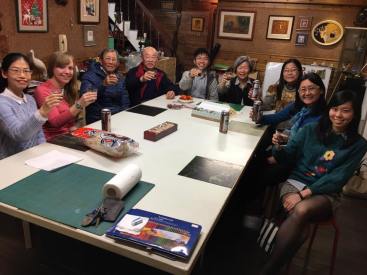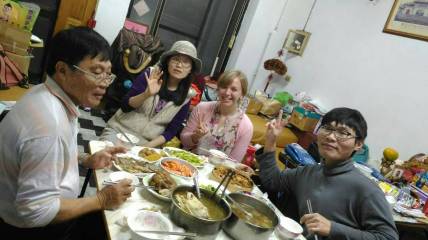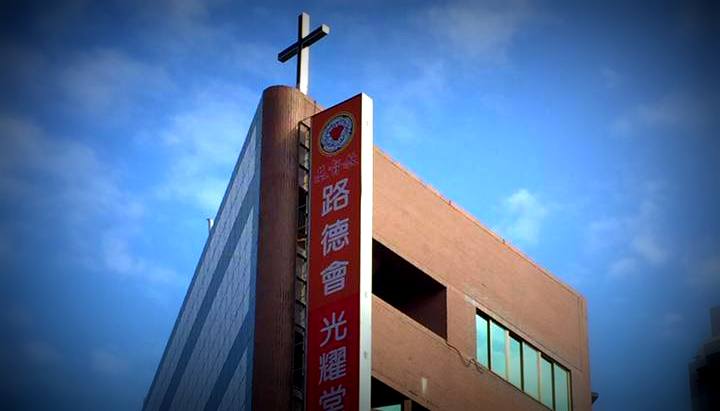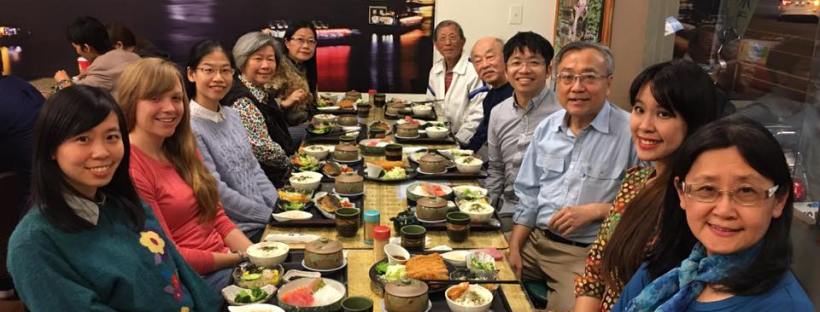I was talking with a friend from the language center recently about ways that living overseas had changed us, and he was surprised to hear me say I’ve come to know God better from my time in Taiwan. Of course this isn’t surprising at all to those of us who believe that every place and every person is God’s creation, that only a world of such vast diversity as ours could begin to reflect the creative power of our God, and that God is with us and at work in us in every time and place. But for so many people that I meet, Christianity is the world of the West, the historic God of America, a fragment of foreign culture that I’ve carried with me to Taiwan along with my taste for cheese and my direct manner of speaking.
But our God is the God of this place, too. And lately I think He’s been using Taiwanese people to teach me about His heart for hospitality.
Anyone who’s been to Taiwan or met a Taiwanese person will tell you how warm and giving they are, how much value they put on relationships, and how thoroughly they anticipate the needs of others and serve before cause has even been given.
Today is the first day of the new lunar year (the year of the rooster in this case) and this  season is the pinnacle of Taiwanese hospitality. It’s a season of reunions with friends and family, treating people to nice meals out or snacks and tea at home, giving red envelopes of money and blessing, and constantly exchanging four-word phrases of well-wishes for the coming year. The past couple of years, I’ve traveled over Chinese New Year, but this year in staying put I’ve been blessed to be included in some of these gatherings.
season is the pinnacle of Taiwanese hospitality. It’s a season of reunions with friends and family, treating people to nice meals out or snacks and tea at home, giving red envelopes of money and blessing, and constantly exchanging four-word phrases of well-wishes for the coming year. The past couple of years, I’ve traveled over Chinese New Year, but this year in staying put I’ve been blessed to be included in some of these gatherings.
Last weekend my former Chinese teacher and her husband came for church again (praise God!) and then took me and another family out for lunch to celebrate the New Year. They graciously put up with me attempting a pre-meal prayer in Chinese (and clapped afterwards – so it must have sounded like a strenuous endeavor), and then warmly shared conversation and reminiscing and plans for the future as we ate together. Both families gifted me with red envelopes of blessing and well-wishes, and my former tutor even teared up as she told me they consider me their daughter.
I also got to share a Chinese New Year meal last week with some of the extended family of the friend whose wedding I was in recently. It was quite a gathering of relatives – distant  enough that we spent a fair amount of time discussing what all of those family relations should be called since none of us were sure of the proper terms in English or Chinese – but it was a gathering tightly knit together by shared love and faith. We started at a restaurant, but then progressed to two different homes to see some of the relatives’ art studios and share additional time together. Even though each of the home visits was relatively brief and we had just come from a very filling meal, each host set out an elaborate spread of fruit and snacks and tea and nearly tripped over each other to refill glasses and urge everyone to 多吃一點 (eat more!). This was one of the first opportunities I’ve had to spend time with a family of all Taiwanese Christians (so many of my friends are first-generation Christians), and it was a gift to see their love and care for one another and to be included as their sister in Jesus.
enough that we spent a fair amount of time discussing what all of those family relations should be called since none of us were sure of the proper terms in English or Chinese – but it was a gathering tightly knit together by shared love and faith. We started at a restaurant, but then progressed to two different homes to see some of the relatives’ art studios and share additional time together. Even though each of the home visits was relatively brief and we had just come from a very filling meal, each host set out an elaborate spread of fruit and snacks and tea and nearly tripped over each other to refill glasses and urge everyone to 多吃一點 (eat more!). This was one of the first opportunities I’ve had to spend time with a family of all Taiwanese Christians (so many of my friends are first-generation Christians), and it was a gift to see their love and care for one another and to be included as their sister in Jesus.
Then last night I got to share Chinese New Year’s Eve dinner with my grocery store friend and her family. It was a very different gathering with a family that doesn’t yet know the Lord, but the hospitality was the same – a huge spread of dishes which the six of us could barely make a dent in, constant urging to eat more and 不用客氣 (don’t be polite), and
fastidious attention to anything I might need. (My friend’s mom even kept telling her daughter how worried she was that she couldn’t properly take care of me since she doesn’t speak English – I kept replying to her concerns in Chinese but she still seemed unconvinced that I could really understand. 🙂 )

After dinner the table was only bare long enough to wipe it off and then it was covered again with fruit and nuts and tea. It was at this point that everyone seemed to relax enough to stop urging me to eat more or faster or slower but instead to just talk. And as God has a way of doing, the conversation quickly turned to faith. My friend’s brother has a girlfriend who’s Christian, and all it took was someone mentioning that I’m a missionary for him and his mother to begin talking about who Jesus is and how He was born and what the Trinity means and so many other matters of faith . . . It was a lot to keep up with in Chinese which limited what I could contribute but it was moving to listen to her brother speak about everything he’s learned (although he was insistent that he only goes to church to accompany his girlfriend). And listening gave me time to silently pray for fruitfulness from the seeds God continues to sow among this family.
And for fruitfulness from the seeds God’s been sowing in my heart through Taiwanese hospitality.
I have a lot to learn about servanthood. Perhaps in part from timidity and in part from selfishness, I’m rarely the first to act when there’s a small opportunity for service. I admire many people I know who acutely anticipate the needs of others and move immediately to serve or to speak words of praise. And as much as I may not do this quickly at home, in Taiwan culture and language only make it more challenging for me to respond promptly and appropriately.
I’ve just started reading Cross-Cultural Servanthood by Duane Elmer, and I can already tell it’s going to be a personally challenging read – but immensely worthwhile. The book challenges Christians to a kind of servanthood that “inhabits our being” and becomes our “deepest identification with Christ” so that “servanthood is not only what we do but what we are” (pg. 22).
Thus far the section that has most deeply caught my attention is Elmer’s explanation of the word ‘hospitality.’ He ties it back to Greek words meaning to love the stranger as well as to the word ‘hospital’ which is derived from the same root. And so he concludes that showing hospitality is “connecting with strangers in such a way that healing [takes] place” (pg. 43).
This means Christ-like hospitality is more than the perfect appetizer to “wow your guests,” a spacious and meticulously clean home, or an entertaining personality. Christian hospitality even goes deeper than Taiwanese generosity and attention to guests’ needs. To live hospitably is to love even the stranger in a way that freely imparts the healing grace we have received from God.
Lord, grant me first to know “to grace how great a debtor daily I’m constrained to be” and then to know and enter into the hurts others carry with them. As Your Spirit lives in me, may I carry Your healing to others. Carry us all to the cross where there is welcome and healing for every soul.
Amen


Always encouraging to read your reflections, Emily! Thank you for your thoughtful insights and willingness to share them. 🙂 Praying for you!
I really enjoyed reading this and finding out more about your visits with the Taiwanian people and how sharing and etc they are. As I told you before I have a friend in Taiwan. She seems so sweet and caring. When my daughter, Melody died, she called me all the way from Taiwan.
She also writes me such sweet emails.
I am praying for you and all of the things that you listed that you would like us to pray for.
Keep up the good mission work. I am praying for you and am proud of you Emily.